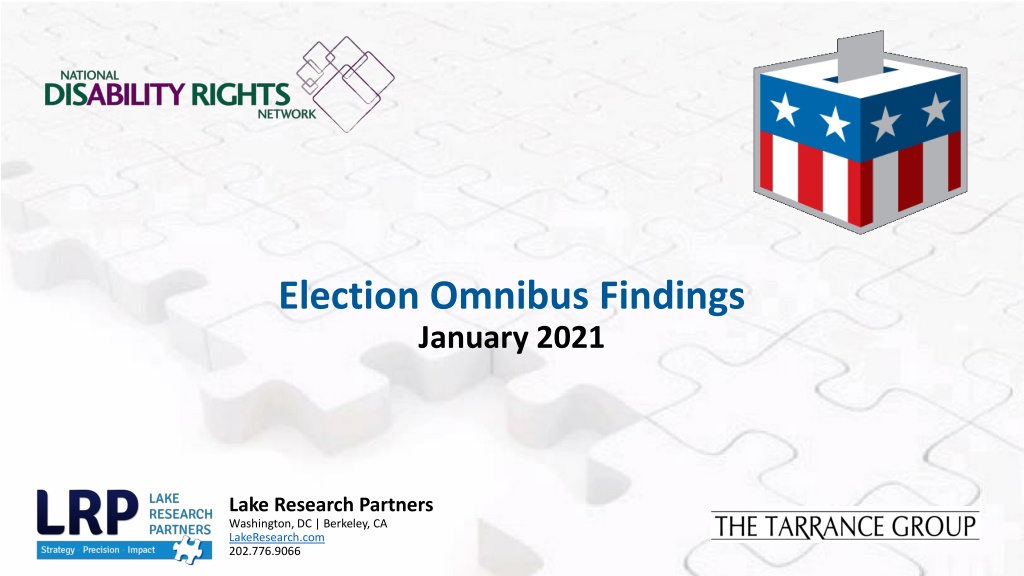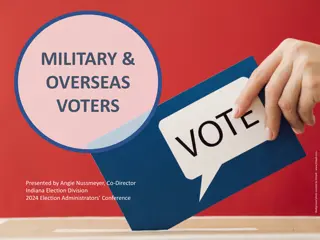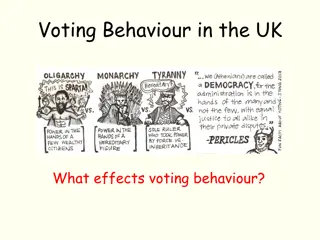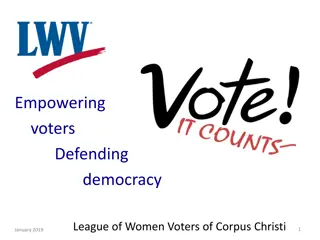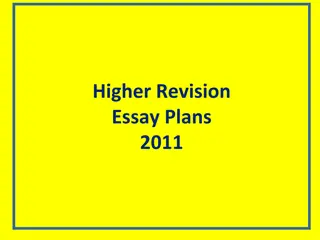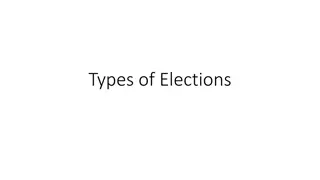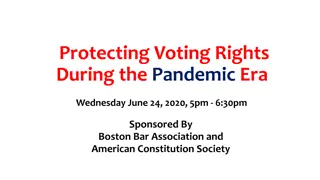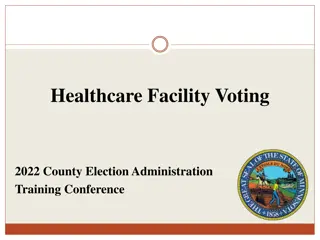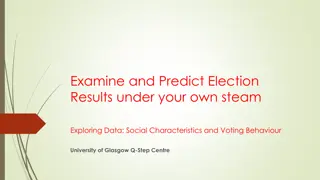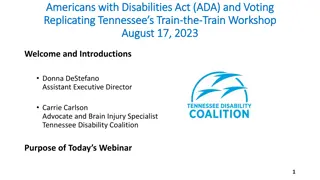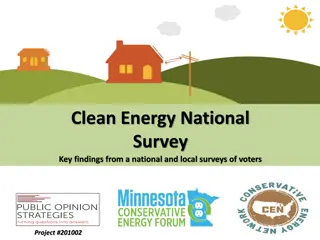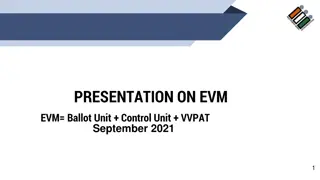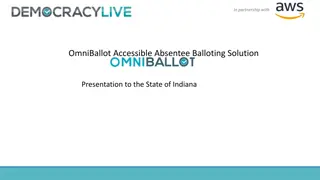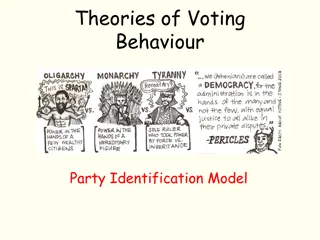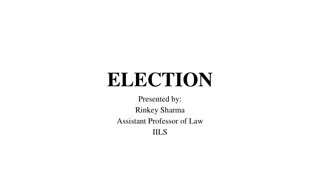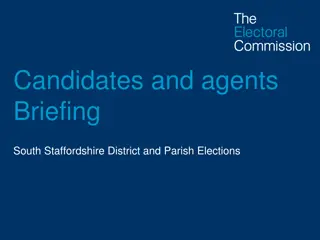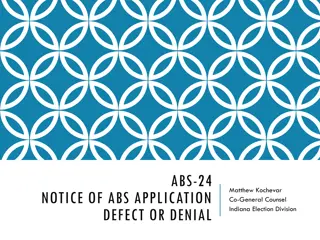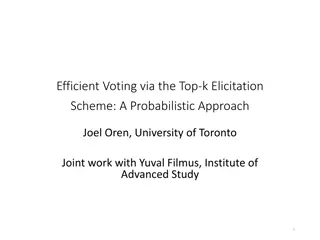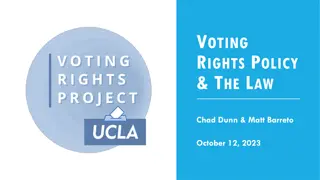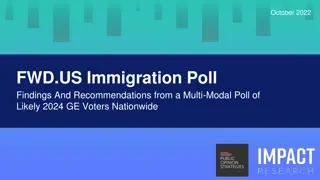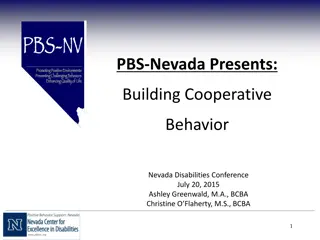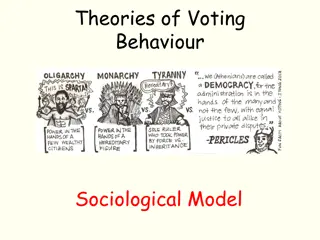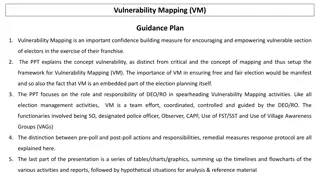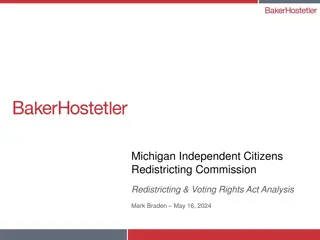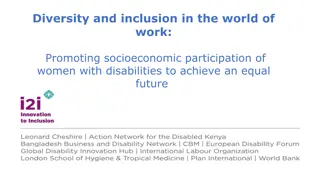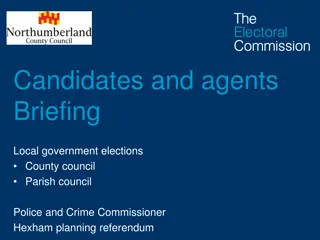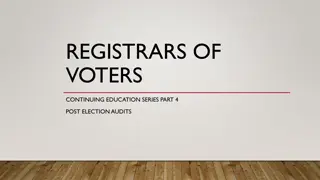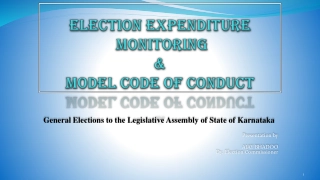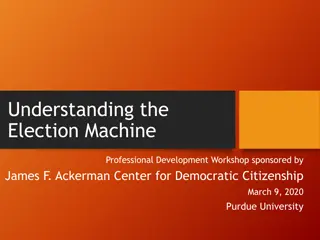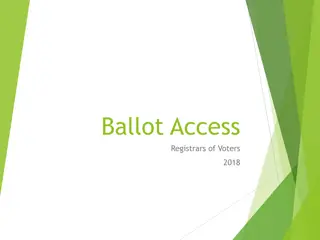Voting Behavior Among Voters with Disabilities in Recent Elections
A recent survey conducted by Lake Research Partners and The Tarrance Group revealed insights on the voting behavior of voters with disabilities in the 2020 elections. The findings indicate that a significant portion of voters have disabilities or have family or friends with disabilities. The majority of voters with disabilities voted for Donald Trump, while those with disabilities/family/friends predominantly voted for Joe Biden. The report also compares voting patterns from the 2016 election, showing a shift in support among this demographic group.
Download Presentation

Please find below an Image/Link to download the presentation.
The content on the website is provided AS IS for your information and personal use only. It may not be sold, licensed, or shared on other websites without obtaining consent from the author. Download presentation by click this link. If you encounter any issues during the download, it is possible that the publisher has removed the file from their server.
E N D
Presentation Transcript
Election Omnibus Findings January 2021 Lake Research Partners Washington, DC | Berkeley, CA LakeResearch.com 202.776.9066 1
Methodology Lake Research Partners and The Tarrance Group designed and administered this pre- election and election night survey which was conducted using professional interviewers from October 31 November 3, 2020. The questions about voting and the demographics reached a total of 2,400 voters nationwide who voted in the 2020 elections or who were planning to vote later on Tuesday 1,335 interviews among voters who were reached on cell phones, including 600 interviews completed by text-to-online, and 1,065 interviews among voters who were reached on landlines (margin of error +/- 2.0%). Issue questions reached a total of 1,200 voters nationwide who voted in the 2020 elections or who were planning to vote later on Tuesday (margin of error of +/-2.8%). Telephone numbers were drawn from the TargetSmart voter file. The sample was stratified geographically based on the proportion of likely voters in each region. The data were weighted to reflect the aggregated Presidential vote as reported in the 2020 exit polls, as well as by gender, age, race, party identification, education, marital status, union household, and census region to reflect the actual proportions of the electorate. Due to rounding some of the numbers in the presentation will not always add to 100%. 2
More than 2 in 5 voters report having a disability and/or having a family member or a close friend with a disability. Throughout this webinar deck, we use either the phrase voters with disabilities/family/friends or P/F/F to refer to the total sample of voters who say they either personally have a disability, have a family member with a disability, or a close friend with a disability. Do you, a family member, or a close friend have a disability, such as a physical, mental health, sensory, learning, cognitive or other disability that impacts daily living? If yes, then please let me know which applies. Voters with disabilities/family/friends 42 Yes,myself 15 Yes, family member 25 Yes, close friend 7 No 57 (don't know) 1 (refused) 1 3
A majority of voters with disabilities overall, including 55% of voters with disabilities in battleground states, voted for Donald Trump. A majority of the voters with disabilities/family/friends voted for Biden 51% to 48%. In 2016, a plurality of voters with disabilities (49%) voted for Clinton. If the election for President were held today, and the candidates were [ROTATE BIDEN AND TRUMP] _ Democrat Joe Biden _Republican Donald Trump, _Libertarian Jo Jorgensen, [AND] _Green Party Candidate Howie Hawkins, for whom would you vote? 55 51 51 51 51 50 49 48 48 47 47 44 All Voters Voters w/ a Disability PWD/family/friends Not Voters w/ a Disability in BG States PWD/family/friends in BG States PWD/family/friends Clinton 2016 Vote Trump Voters w/ a disability 46 49 PWD/family/friends 48 47 Democrat Joe Biden 4 Not PWD/family/friends 47 46 Republican Donald Trump
Voters with disabilities nationwide split their votes evenly between the Democratic and Republican candidate. Among voters with disabilities in battleground states, 52% voted for the Republican candidate. Half of all voters with disabilities/family/friends voted for the Democrat. In the election for Congress, will you vote for [ROTATE: _the Republican candidate or _the Democratic candidate? [IF UNDECIDED, ASK]: Which candidate do you lean toward at this time? 52 51 51 50 49 49 49 49 48 48 48 47 All Voters Voters w/ a Disability PWD/family/friends Not PWD/family/friends Voters w/ a Disability in BG States PWD/family/friends in BG States 2016 Vote Republican Democrat Democrat Voters w/ a Disability 41 54 Republican Voters w/ a Disability/Family/Friends 48 50 5 Not PWD/family/friends 50 48
Among voters with disabilities and those connected to voters with disabilities, COVID-19 and the economy and jobs were the most important issues in deciding for whom to vote. Voters with a family member or close friend were likely to list health care as an important issue and voters with disabilities were more likely than voters overall to list Social Security and Medicare as an important issue, too. I am going to read you a list of issues that may have come up during the election. Please tell me which one or two of these was most important to you in deciding from whom to vote. [TOP TIER] 26% 26% 22% The economy and jobs 28% 26% 24% COVID-19 25% 30% 19% 15% Health care 21% 24% 17% 15% Dysfunction in government 18% 13% 14% 14% Racial justice 12% 20% 13% 13% 17% Social Security and Medicare 10% Total PWD/Friends/Family Voters with Disabilities Family Member Close Friend 9% 9% The environment and climate change 10% 10% 8% 9% 9% 7% Taxes 9% 10% 10% Terrorism/National Security 6% 10% 9% 12% Immigration 3% 6
Candidates and Disability Issues 7
Less than one-third of voters overall remember hearing, reading, or seeing anything from congressional or presidential campaigns about issues that are important to people with disabilities. African American voters are most likely to recall hearing something from campaigns. Independents and voters in the Midwest are least likely. Leading up to the November 2020 General Election, did you hear, read, or see anything from congressional or presidential campaigns about issues that are important to people with disabilities? All Yes 30 32 32 30 33 26 35 29 30 38 29 29 34 26 32 No 64 62 62 65 62 68 61 64 65 57 66 64 61 69 61 Men Women Under 50 Over 50 Northeast Midwest South West White African American Latino API Democrat (ID) Independent (ID) Republican (ID) 63 31% Yes 19 14 14 5 Yes, heard Yes, read Yes, saw No (don't know) Among those who heard, read, or saw something, 53% voted for Biden and 46% voted for Trump. Those who heard, read, or saw something voted 53% for the Democratic candidate and 46% for the Republican candidate on the congressional ballot. 8
Voters with disabilities, particularly women with disabilities, and voters with a close friend with disabilities are most likely to have heard, read, or seen something. Leading up to the November 2020 General Election, did you hear, read, or see anything from congressional or presidential campaigns about issues that are important to people with disabilities? PWD/ Family /Frien ds 23 PWD BG States PWD Men PWD Women PWD <50 PWD 50+ Voted Trump Voted Biden All PWD Family Friends P/F/F in BG States Yes, heard 19 25 22 23 26 24 25 26 22 22 18 20 Yes, read 14 15 19 31 18 14 16 22 9 7 13 13 16 Yes, saw 14 17 13 28 16 11 22 21 13 13 17 14 14 All yes, combined 31 41 36 47 38 36 46 41 42 33 33 31 33 No 63 55 59 51 58 61 50 55 55 61 62 63 63 9
Across demographic subgroups, a solid majority of voters believe it is very important that congressional and presidential campaigns address issues that are important to people with disabilities. African American voters are especially likely to say it is very important. Very Important Not Important Men Women Under 50 Over 50 Northeast Midwest South West White African American Latino API Democrat (ID) Independent (ID) Republican (ID) Trump Biden 59 60 57 62 59 60 61 57 59 77 56 34 68 59 52 51 68 13 10 11 11 11 11 11 12 12 7 13 17 8 8 17 15 7 How important is it to you that congressional and presidential campaigns address issues that are important to people with disabilities? 86 60 11 3 Important Not important (don't know) Somewhat important A little important 10 Very important Not important at all
We see the greatest rating of importance for issues for people with disabilities among voters with disabilities, especially those in battleground states, men with disabilities, older people with disabilities, and Biden voters who heard something around disabilities during the election. How important is it to you that congressional and presidential campaigns address issues that are important to people with disabilities? PWD/F amily/F riends 69 21 6 3 Heard Issues Biden 82 17 1 0 Heard Issues Trump 62 27 9 2 Didn t Hear Biden 62 25 8 2 Didn t Hear Trump 48 32 11 6 PWD BG States 79 11 6 2 P/F/F BG States 62 25 8 3 All PWD Men PWD Women PWD <50 PWD 50+ PWD Fam Friend Voters 60 26 8 4 81 12 4 1 66 24 6 3 60 30 5 5 84 8 6 1 78 16 3 2 76 16 7 1 86 10 2 1 Very important Somewhat important A little important Not important at all 86 11 94 6 90 9 90 10 90 9 93 7 95 4 92 8 95 4 99 1 88 11 86 10 80 17 91 8 88 10 Important Not important 11
At least 9 in 10 voters agree that our communities are at their best when all people, including people with disabilities, have opportunities, and that people with disabilities should be at decision making tables just like everyone else. Voters also strongly agree with statements that call for disability issues to be included in national policies and for candidates and their campaigns to include this constituency in their efforts and fight against stigmas and bias. Now let me read you some statements and please tell me if you agree or disagree with each statement. [TIER ONE] All Voters Our communities are at their best when all people, including people with disabilities, have the opportunity 80 92 People with disabilities should be at decision making tables, just like anyone else. 76 90 Disability issues should be included in national policies on health care. 73 88 Candidates and their campaigns should reach out to and include people with disabilities in their efforts 70 87 America s leaders should fight stigmas and bias that limit opportunities for people with disabilities. 70 86 Not so strongly agree Strongly agree 12
At least two-thirds of voters also strongly agree with statements that center people with disabilities and highlight their contributions to the workplace, underscore the historical biases they have faced, and talk about how voting on issues important to this community can bring about change. Statements focused on the individual around the issues and motivation to vote fall into a second tier. Voters are more likely to strongly agree that issues around disability and healthcare influence their motivation to vote rather than disability issues alone. Now let me read you some statements and please tell me if you agree or disagree with each statement. [TIER TWO] All Voters People with disabilities bring unique talents to the workplace that benefit employers and organizations. 69 87 People with disabilities have faced deep inequality, ableism and oppression. They need to be heard. 68 85 Voting on the issues that matter to the disability community can bring about change. 66 86 Issues around disability and health care influence how motivated I am to vote.* 43 66 Candidates' stances on issues around disability influenced who I voted for in the election. 38 57 Issues around disability influence how motivated I am to vote* 35 59 Not so strongly agree 13 Strongly agree *split sampled question
The top tier of statements is also strong, especially among voters with disabilities. More than 9 in 10 older voters with disabilities and voters with disabilities in battleground states strongly agree our communities are at their best when all people, including people with disabilities, have the opportunity to get skills, jobs, and succeed. Tell me if you agree or disagree with each statement. [TOP TIER] PWD PWD/F amily/F riends Heard Issues Biden Heard Issues Trump Didn t Hear Biden Didn t Hear Trump PWD BG States P/F/F BG States All PWD Men PWD <50 PWD 50+ % Strongly Agree PWD Fam Friend Voters Wome n Our communities are at their best when all people, including people with disabilities, have the opportunity People with disabilities should be at decision making tables, just like anyone else Disability issues should be included in national policies on health care Candidates and their campaigns should reach out to and include people with disabilities America's leaders should fight stigmas and bias that limit opportunities for people with disabilities 91 85 84 87 91 91 86 95 88 81 83 73 80 92 87 85 84 81 78 80 77 77 77 63 80 81 76 87 86 83 83 82 79 83 84 76 86 84 85 85 86 83 69 66 66 82 83 77 70 61 61 76 85 80 73 88 84 70 79 75 79 75 68 75 79 78 78 80 82 70 77 57 70 80 75 14
Voters with disabilities strongly agree with all statements at higher rates than overall voters with disabilities/family/friends overall, as do Biden voters who heard about issues around disabilities from campaigns. Younger voters with disabilities are more likely than older voters with disabilities to strongly agree that candidates stances on issues around disability influence who they voted for and how motivated they were to vote this election. Tell me if you agree or disagree with each statement. [SECOND TIER] PWD/F amily/ Friends Heard Issues Biden Heard Issues Trump Didn t Hear Biden Didn t Hear Trump PWD BG States P/F/F BG States All PWD Men PWD Women PWD <50 PWD 50+ % Strongly Agree PWD Fam Friend Voters People with disabilities bring unique talents to the workplace that benefit employers and organizations People with disabilities have faced deep inequality, ableism and oppression. They need to be heard Voting on the issues that matter to the disability community can bring about change Issues around disability and health care influence how motivated I am to vote* Candidates' stances on issues around disability influenced who I voted for in the election Issues around disability influence how motivated I am to vote* 69 83 75 60 76 81 85 78 87 80 66 72 62 82 75 68 84 70 65 73 81 86 83 85 84 54 77 59 84 72 66 43 38 79 53 54 50 71 49 40 35 59 42 36 49 72 50 43 41 81 51 57 52 77 55 51 47 78 50 57 57 80 55 52 44 81 65 59 49 61 40 39 26 72 47 42 42 59 31 25 24 79 69 49 48 56 47 35 48 40 15 *split sampled question
There has been a 10-point increase in intensity among people with disabilities and a 5- point increase among the voters with disabilities/family/friends strongly agreeing that issues around disability influence how motivated they are to vote. Issues around disability influence how motivated I am to vote* PWD PWD/Family/Friends 2020 50 70 2020 41 66 2019^^ 2019^^ 40 64 36 63 *split sampled question ^^Lake Research Partners conducted a mixed mode survey for NDRN from August 12 August 20th, 2019 among 1,000 adults nationwide with a disability, or who have an immediate family member or close friend with a disability. Not so strongly agree 16 Strongly agree
Voters with disabilities, particularly women with disabilities, are very concerned that cuts to health care and the ACA will have a negative impact on people with disabilities. How concerned are you that cuts to health care and the ACA will have a negative impact on people with disabilities? PWD/F riends/ Family BG States 46 PWD/F amily/F riends PWD BG States PWD Men PWD <50 PWD 50+ All PWD Family Friends PWD Women Voters Very concerned Somewhat concerned A little concerned Not concerned at all 41 22 14 19 52 18 8 15 47 42 46 44 60 54 50 47 19 18 20 19 17 17 20 14 17 12 22 13 8 9 10 7 10 15 20 15 18 21 8 17 12 20 19 Concerned Not concerned 62 32 70 23 65 60 65 63 77 71 70 62 63 32 37 31 30 16 28 19 31 33 17
Questions? 18
